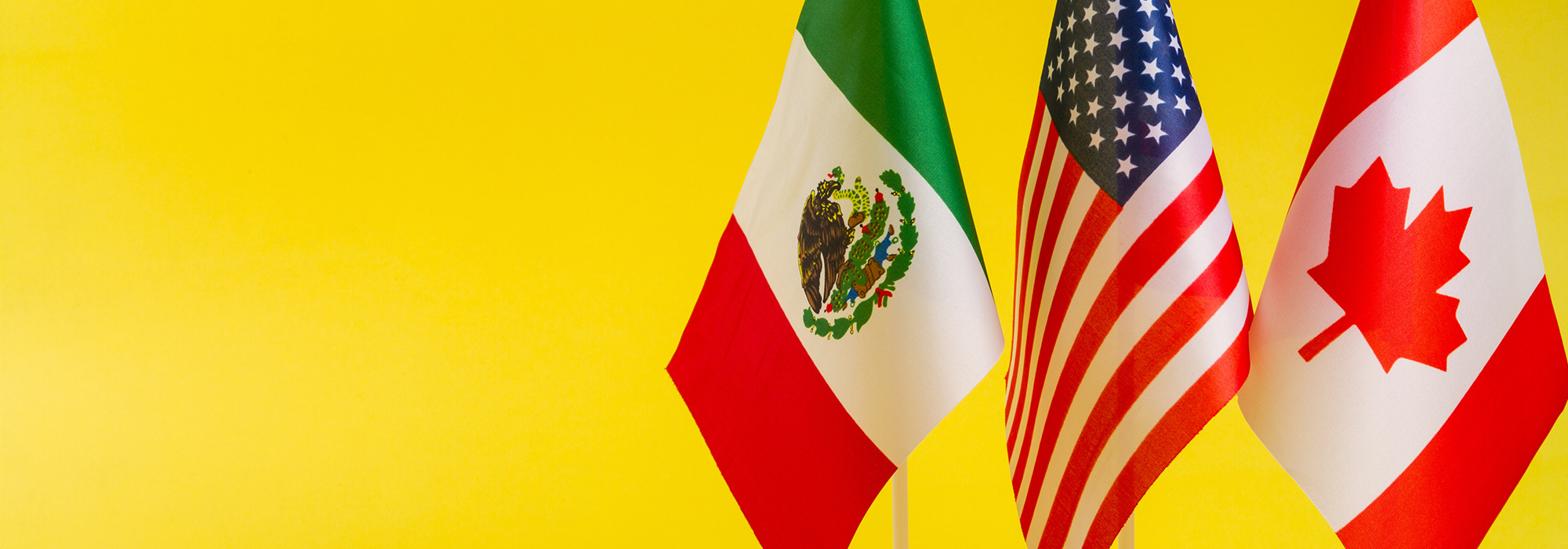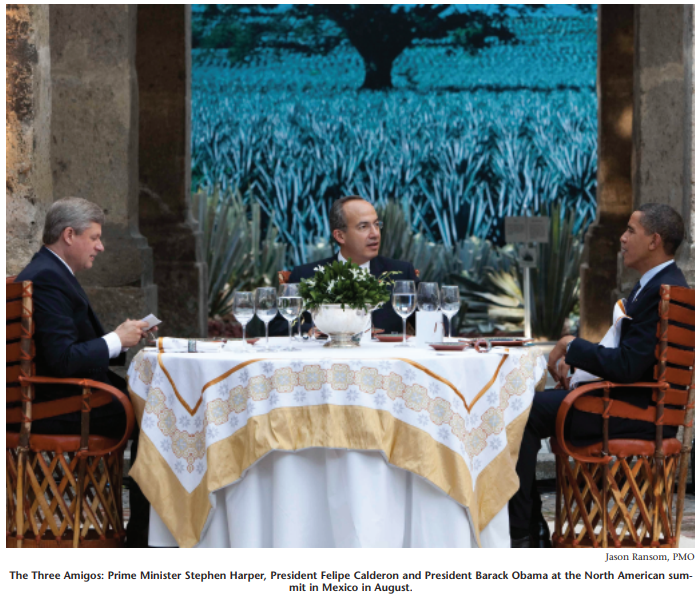
Is there such a thing as a North American Community, a specific idea of North America? Ronald Reagan thought so. He made a “North American Accord” part of his 1980 campaign pitch. It wasn’t clear what he meant in concrete terms. Marc Lortie, who was then in charge of press relations at the Canadian embassy in Washington, recalls Richard Allen, Reagan’s first national security adviser, calling him during the transition after the election to ask what we “up in Canada” thought it could mean.
For Reagan, it was what a Quebec pop song once called “une question de ‘feeling.’“ He intuitively felt North America potentially could be a shining example for the rest of the world as to how countries and neighbours should try to solve their problems. He didn’t have much of a special feel for Canada, though Brian Mulroney jumped on the opportunity a few years later to fill that part in. But as a Californian, Reagan had a “feeling” rooted in the reality that between the US and Mexico, neighbourly history had been pretty vexed, and the present trends left a lot to be desired.
I offer a dark family anecdote in illustration. My American great-grandfather ran a British railway consortium in Mexico that thrived during the long dictatorship of Porfirio Diaz. When the revolution of 1911 chased out the Diaz regime, the rebels also went for some of those they thought of as its profiteers, and chased my great-grandfather all the way to the US border town of Matamoros. His extended family, including my mother, was allowed to cross the Rio Grande to Brownsville, Texas, but he was held in the Matamoros slammer for a year or so until the State Department got him out.
A couple of years later, a Memorial Day parade in Brownsville featured the usual colour party of soldiers carrying Old Glory. When a Mexican-tejano spectator did not remove his sombrero, to teach him a lesson my greatgrandfather smote him with his silver-headed cane, with unintended lethal impact. Great-grandfather was taken briefly into custody, but charges were swiftly dismissed on the grounds that he had only been exercising his patriotic duty.
Just one grim story among many, but it has given me an inherent sympathy for Mexicans all my life.
If some kind of a new North America can be brought to pass, one that incorporates and supports the warm and generous Mexican people, especially now that they are struggling to make a genuine democracy work despite some immense problems, this would indeed be a fine outcome, and possibly an example to the rest of the world. But a more integrated North America would be more than an example: by working more closely together, the three countries of North America could deal more effectively with some of the transborder challenges such as crime and drugs, illegal migration, and pollution.
Yet some Canadians recoil from this concept of North America and deny that it would confer benefit on Canada.
There is, in a few academic quarters, a fundamentalist school of continentalist thought whose holy text is the Canada-US Free Trade Agreement. Its disciples, often recycled veterans of past and often arcane trade policy battles with US officials, award Canada’s trading relationship with the US such paramount importance that they judge every other relationship Canada might have in the world to be a damaging and deluded distraction. For some, this includes renewal of serious policy investment in a partnership with Mexico.
Attempts to triangulate relationships with the US and Mexico are a special bête noire. A recent op-ed in the Globe and Mail by former Mexican top official Andres Rozental and US Latin American scholar Robert Pastor argued the merits of reinforcing the North American concept. It evoked from the normally bigpicture John Manley a sour and uncharacteristically parochial counter op-ed (co-signed by a former US ambassador to Canada) whose thrust was that Canada-US relations and problems are too important to be associated with anything to do with Mexico, whose relationship to Canada was deemed to be “an economic arrangement only,” of recent invention, lacking the “deep historical ties” Canada has with the United States.
This is the school of belief that holds Canada’s relationship with the US to be truly “special.” As a former diplomatic practitioner in Washington who keeps his hand in via Washington boards, I can report a wide number of countries claiming such a “special” relationship. Add China to a list that includes Israel, Poland, Ireland, Japan, Australia and the fervently special UK.
Official Washington’s boredom with Canada is a handicap given that Canada certainly does have real and nationally important issues to defend in the bilateral Canada-US relationship. Their significance for us is to some extent a function of our by now chronic overdependence on the US market at a time when the US economy is in decline.
If any country is actually more special than the others, it probably is Mexico. Apart from all the transborder issues, there is the central political fact that there are 12 million Mexican citizens in the US and 25 million potential Mexican-American voters.
The school of Canadian complaint recognizes the importance of the Mexico-US relationship, and the difficulty of some of their bilateral issues. Indeed, they possibly exaggerate them so as to illustrate that doing anything at the level of los Tres Amigos will only expose to the American side that US-Canada problems are a lot less real and important to the US by comparison.
The reality, though, is that this is already the general view of the Obama administration — because it’s true. Obama’s backhand dismissal at the August 10 “Three Amigos” summit of Canada’s nagging over the “Buy America” provisions of the Recovery Act, as being something to be “placed in perspective,” was eloquent confirmation.
When Carlos Pascal appeared before a Senate committee panel as the Obama administration’s nominee as ambassador to Mexico, several heavyweight senators asked to attend. When the nominee as ambassador to Canada appeared, there was only the interim appointee from Delaware, who replaced Joe Biden, whose instructed presence allowed the hearing to take place.
Official Washington’s boredom with Canada is a handicap given that Canada certainly does have real and nationally important issues to defend in the bilateral Canada-US relationship. Their significance for us is to some extent a function of our by now chronic overdependence on the US market at a time when the US economy is in decline. Canadian exposure has been deepened by the thickening of the Canada-US border since 9/11 that has contributed to what Fen Osler Hampson of Carleton has darkly termed a “siege mentality” in North America. Barriers to cross-border movement are in stern contradiction to “the freer flow of people in North America” that the Council on Foreign Relations called for in its 2005 report Building a North American Community, a flow that Canadians assumed would support a new reality of interactive, just-in-time supply chains across the border.
We have not succeeded in making ourselves part of a North American border solution despite spending billions of dollars in our exclusive focus on Canada-US border security enhancement. The Chrétien government resisted Mexican proposals just after 9/11 to work together with the US on a three-way strategy for common perimeter security. Canadian reasoning was that the vexed Mexico-US border and immigration problems would hold back progress on our US border that we judged to be more straightforward.
But as it has turned out, Homeland Security Secretary Janet Napolitano has made it clear that her consideration for the politics, as well as for Mexican sensitivities and perspectives we didn’t want to be involved with, are such that the US is not going to give Canadians an easier pass anyway. We underestimated the value to us of connecting to the US on Mexico-related issues that are politically central to them.
There is also a serious question in US minds whether we merit such a pass. Canada has for 25 years had a costly refugee determination system that is absurdly frivolous, as Prime Minister Harper had the honesty to acknowledge when imposing a visa regime on the Czech Republic and Mexico itself. Because we cannot control without visas who is admitted to Canada by off-the-wall refugee boards that can’t distinguish discrimination from persecution or welfare shoppers from real refugees, we have had to offend good partners like the Czechs and Mexicans while not cleaning up our act enough to satisfy the US that we know who is in our country.
The bigger political problem is that there is now a disconnect of tone and comfort between an administration in Washington that in a time of crisis has turned to New Deal-dimension government solutions and a Conservative prime minister in Canada for whom government has always been seen as something to reduce in the taxpayers’ interests. On major policy vectors, such as energy and climate change, we are not “on the same page,” as Environment Minister Jim Prentice had blissfully hoped on his first visit to Washington after Obama’s election.
Basically, Canada is not yet on the Obama administration’s political screen. Sending to Washington as ambassador an NDP premier from Manitoba is a statement of sorts to Canadians, but will be lost on political circles in Washington whose attention deficit to things Canadian is chronic.
We have to work all-out to draw US attention to the importance of the Canada-US relationship, in a “permanent campaign,” as savvy communications sage Colin Robertson has argued in these pages.
But to build deployable political capital for such a campaign, we need to be a creative partner in joint North
American solutions, and in world terms, to be helpful on things that really matter to the US, especially at a time when the US role in the world is under challenge and is perceived to be in decline. Canada can help itself by making a politically redeemable contribution that is authentically “Canadian” in content. This should never include lining up blindly behind initiatives as bone-headed as the invasion of Iraq, which we trust are now as much in the past as the Bush administration.
Afghanistan is a crucial inherited preoccupation for this president, who has on his mind the nightmare of Lyndon Johnson, who also tried to pass sweeping and controversial legislation for social change at home at the same time as he was fighting what became a losing war abroad.
Canada has done its hard Afghan duty in part to play to that angle in Canada-US relations, and in 2011 our costly combat role will be played out. We shall still have an important contribution to make to Afghanistan’s democratic development, provided the Afghan government can recover from what is looking like a disgracefully corrupted presidential election that threatens to make a mockery of our best intentions.
So in what other ways can Canada generate influence? For many years at the UN, in relations with China, in Africa or with Moscow, Canada played a complementary if differentiated role that was helpful to Washington at various times for various reasons.
The current Canadian government has chosen to turn away from these specific emphases.
Yet it does talk the talk about strengthening relationships with “emerging economies” and with Latin America. The logic, then, of looking toward Mexico, whose economy has emerged to be the second largest in Latin America, seems irrefutable.
The Mexican relationship could provide the sort of helpful role Canada could play today on the US agenda. Instead of shying away from three-way cooperation, we should work enthusiastically with the US and Mexico to re-invigorate the North American concept, a project that Barack Obama reportedly favours. His administration has quietly interred the Security and Prosperity Partnership his predecessor created in 2005. The results of the recent Guadalajara meeting were widely considered as “desultory,” in part because it was still playing out a three-way security-obsessed scenario that urgently needs re-thinking.
To replace the US border-security preoccupations and official process that was all but invisible to the public, Obama is leaning to a much more transparent three-partner initiative, decentralized, engaging civil society and business.
This would be in line with the 2005 Council on Foreign Relations report cited above, for which John Manley in his customary more enlightened role co-chaired the task force. But even this well-meant advice may involve a false choice. It advised that “the three governments should approach continental issues together with a tri-national perspective rather than the traditional ‘dual-bilateral’ approach that has long characterized the relationship.” Actually, a tri-national perspective need not lessen in any way the intensity of the bilateral relationships involved.
Canada can work bilaterally and trilaterally to support Mexico’s efforts to consolidate its democratic breakthrough and to modernize effectively. It is a course that on its merits deserves our attention and effort. But it can also help Canada with Washington.
No one should have the illusion that there is not a lot of trouble and woe in Mexico today. Certainly that is almost the sole narrative in reporting on Mexico in Canadian media.
Drug wars and drug-related corruption and killings (over 10,000 since President Felipe Calderon took office in December 2006) drive the headlines.
Violence has not only been drug-related. In 1994, there was violent conflict with Zapatista rebels in Chiapas. There were scandals associated with political murders, including that of the secretary-general of the then-ruling PRI party that implicated Raul Salinas, brother of the president. Also, hundreds of young women were killed in a chain of pathology that has so far evaded coherent explanation.
The drug issue is not straightforward. The 1993 killing of Colombian drug czar Pablo Escobar led to the breakup of his operation and other cartels at a time when US and regional efforts to semi-seal Caribbean transit routes into the US drug market were succeeding. Weakened Colombian exporters began to re-route cocaine from Colombia through Mexico instead, so that today Mexico accounts for 90 percent of US cocaine consumption, along with heroine and marijuana.
Paradoxically, it was the advent of real democracy in Mexico that in 2000 signalled the end of the sweetheart arrangements between drug lords and Mexican authorities that had discreetly persisted under the 50-year “perfect dictatorship” of the PRI.
The two successive democratic regimes of Vicente Fox and his successor Felipe Calderon resolved that the federal government would clean up its corruption/drug act, and crack down on the narco mobs. President Calderon declared a “War on Drugs” and deployed the Mexican army to troubled cities and areas. Critics of the policy such as political writer Alma Guillermoprieto consider his surge against the drug lords has had the effect of ramping up the violence. It is argued the crackdown helped drive Mexican drug gangs into the vacuum in Colombia and at home into open competition and violent conflict.
But it’s hard to see that the president had practical alternatives.
Both presidents Fox and Calderon were also determined to decentralize the political institutions and authority of the federal state. So while federal authorities who were indisputably corrupt are now more or less clean, the gangs operating locally, especially in the border access towns of Nuevo Laredo, Tijuana, Ciudad Juarez and Matamoros, target local authorities and have more money to splash around than local and provincial officials can resist. The gangs are operating in all 31 states.
Illegal immigration has been replaced as the big US border worry by the traffic in drugs and weapons. Both President Obama and Secretary of State Hillary Clinton acknowledge it is inherently an American-sourced problem that Mexico gets from adjacency to the biggest drug market in the world. That market now includes Canada, and we are importing some of the violence along with the drugs. We need to be part of the solution.
Illegal immigration has been replaced as the big US border worry by the traffic in drugs and weapons. Both President Obama and Secretary of State Hillary Clinton acknowledge it is inherently an American-sourced problem that Mexico gets from adjacency to the biggest drug market in the world. That market now includes Canada, and we are importing some of the violence along with the drugs. We need to be part of the solution.
Mexico’s situation is already under strain from the economic crisis. The financial crash kicked in a recession in Mexico that saw the economy whacked by 10.3 percent negative growth in the second quarter of 2009.
As if Mexico were undergoing a Job-like national trial of miseries, part of the downturn was caused by the costs of swine flu, or A/H1N1, which afflicted Mexico this spring and effectively kept Mexico City’s 22 million inhabitants from work or anything else public for more than a week, as well as depressing the third-biggest sector in the economy, tourism.
But though the picture seems dark, it is wrong to shudder and turn away. As Shannon O’Neil of the Council on Foreign Relations wrote in the August-September issue of Foreign Affairs, “The rising hysteria clouds the real issues for Mexico and for the United States. The question is not whether the Mexican state will fail. It will not…The government regularly holds free and fair elections, and its legitimacy, in the eyes of its citizens and of the world, is not questioned…The actual risk of the violence today is that it will undermine democracy tomorrow.” The strains that the narcotraficante culture is putting on Mexican morale and on democratic institutions also concern Canada.
In fact, the substance of a very substantial relationship is there.
Today, the Bank of Nova Scotia has 1,500 branches in Mexico. There are over 1,400 Canadian firms doing business there. Two-way trade is up 500 percent since 1993 to $12 billion, and is in current stride increasing at 12.5 percent a year, a good sight better than growth of Canadian business in the US market. Investment in Mexico has gone from $1 billion to $7 billion.
Of course, there are each year also well over 1 million tourist visits to Mexico from Canada (15 million from the US). In the course of reporting this article, I have talked with several dozen British Columbians who regularly visit. Many stay in a tourist bubble in resort towns, unaware of much that is authentically Mexican. From their tourist condo bubble, drug violence is not at all apparent. The surprise is the number of Canadians I have met who do rent in Mexican native surroundings, who plunge into Mexican culture and who say they don’t even lock their doors.
There is a problem of stereotypes in the Canadian impression of Mexico that understates what is permanent and precious in Mexican mestizo culture and heritage, as well as the modern sophistication of Avenida Reforma in Mexico City. Alma Guillermoprieto laments the cultural costs of increasing North American homogenization, such as the decline of ranchera music, and the improbable displacement by Taco Bell of authentic tacos, but the rising prosperity of the 30-million-strong middle class and the emergence of democratic transparency are historic compensations.
Canada has provided support already for democratic transition. Vicente Fox immediately seized that Canada could be a strategic partner in Mexican democratization and modernization of institutions. Jean Chrétien cautiously resisted formalizing institutions in any joint way, but he met with President Fox several times. Canadians mentored Mexican counterparts on the development of a law on access to information, on accountability generally and on federalism, and have helped counsel and train officials in the police and customs on their procedures and public obligations. In the sort of North American Community accord the Obama administration is thinking about, cooperation would extent to parliamentarians, universities and service organizations so that our people-to-people connections are reciprocal rather than the one-way dimensions of tourism and economic migrants.
There is much that comes back to Canada from this kind of family partnership. Quite apart from the inherent rewards of a richer foreign relationship — and Canada is perfectly able, indeed is obliged, to pursue in our own interests many such relationships, especially in Europe and in Asia — there is a multiplier effect.
Mexico used to be sort of a standoffish onlooker in Latin America, suspicious of the OAS. Today, Mexico is more of a potential ally for Canadian efforts to give substance to our still mostly theoretical outreach southward in the hemisphere. In foreign policy, the post-nationalist governments of Fox and Calderon have been more willing to relax Mexican obsessions with the prerogatives of national sovereignty (earned over time from foreign interventions) and support international human security initiatives with which Canada has been so associated, such as the responsibility to protect civilians and the International Criminal Court. The Harper foreign affairs appointees may have placed the phrase “human security” on their vocabulary blacklist as a Liberal pennant to be packed away, but it remains seen internationally as a hefty part of the Canadian brand, as is “peacekeeping,” another international responsibility about which Mexicans were for decades cool, but today support (though they are still unwilling themselves to let their army operate outside the country). Canada and Mexico have just inaugurated military-to-military talks that are considered valuable to both.
But Canadian-Mexican relations are nonetheless said to be today languishing in spirit, especially on NAFTA issues.
Officials from the two countries visit regularly, but they don’t discuss the bigger North American picture framed by NAFTA.
Former Canadian ambassador David Winfield recalls the burst of vigour that followed the signing of NAFTA. Brian Mulroney had pushed Canada and the US from an FTA with only the US to a three-way NAFTA, partly to help the US with Mexico, but also because he was afraid that if the US only had two bilateral deals with its neighbours, Canada would get short shrift — which is where we are.
Mexican observers speak of a “lack of enthusiasm” on the Canadian side. Stephen Harper had originally described himself as a “friend” of Mexico, and attended President Calderon’s inauguration, the first Canadian prime minister to do so. But the Mexican president said that the way the visa issue was handled was not the way of a friend. Robert Pastor terms the handling as “brusque and discourteous.”
On NAFTA, Mexican friends speak of Canada’s approach in recent years as emphasizing our differences rather than the advantages in finding points and purposes in common. In regretting the “squandered opportunities,” Andres Rozental has written, “The idea that Canada has a unique special relationship with the US that somehow differentiates it from Mexico — and other countries with which Washington has close ties — has done much damage to the concept of an integrated North America and has stymied efforts by those of us who strongly believe in the advantages of building a North American community.”
In London, in 2001, the three diplomatic missions to the UK co-hosted social and communications events at the three UK political party conferences. They made each of the countries somehow seem bigger, and frankly, in our case, more interesting.
The Tres Amigos summits will continue. Canada hosts the next one. It should be the launching point for a new and invigorated North American Community, based on healthy vibrant two-way partnerships and an enlightened engagement at the three-way level that engages our societies.
Whoever is in government in Canada next year, this is an opportunity we cannot afford to squander, from the standpoint of all our interests, including in Washington.
Photo: Shutterstock










